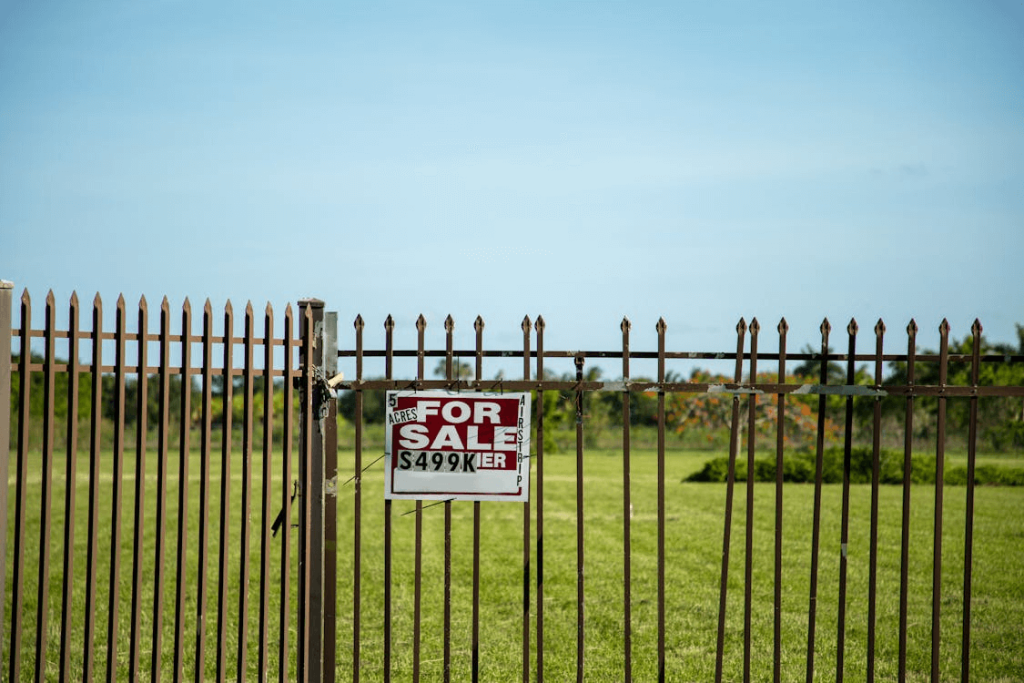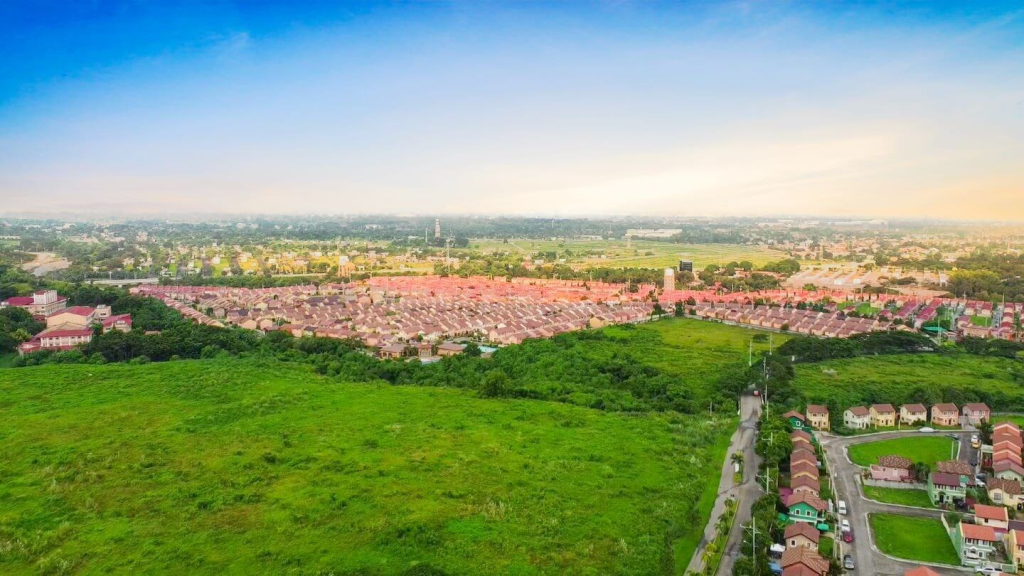For many Filipinos, land ownership is both a financial move and a lifelong dream. Having a property in the Philippines is often attached to stability and security.
Lots, in particular, are versatile investments. You can build your dream home on top of it, keep it as an investment, or pass it down to the next generation.
If you want a lot-only property of your own, this guide will walk you through the essentials of choosing the right one, from lifestyle considerations to financial requirements and legal documentation.

Photo by On Shot: https://www.pexels.com/photo/fenced-plot-of-land-with-for-sale-sign-4525178/
Step 1: Set your goals for property ownership
Before you begin your buying process, make it clear why you’re buying the property.
Ask yourself: are you buying land to live on, or are you acquiring land as a significant investment? Some buyers choose residential lots to eventually build their dream house, while others invest in commercial space for business opportunities.
Property type considerations
- Residential lot: Perfect for families who want to create a long-term home.
- Commercial lot: Suited for entrepreneurs looking to establish businesses.
- Pre-selling properties: These often come with more flexible payment schedules, making them attractive to first-time buyers.
Whatever your decision, remember that land in the Philippines generally appreciates in value over time, and either route is a wise choice.
Step 2: Conduct a property search and due diligence
A thorough due diligence process is essential when you buy land. It ensures that the property you’re eyeing is legitimate and free from future disputes. But what does due diligence entail? Here are the top two things:
1. Confirming ownership
Start by securing the latest tax declaration and land description from the municipality’s assessor’s office. Then, verify the property title or transfer certificate of title to confirm ownership.
2. Professional assistance
Work with a licensed real estate broker or real estate agent. Their expertise can help you navigate legal documents, validate the actual sale price, and ensure that all requirements are met.
Step 3: Understand the legal documentation
Legal documentation is the backbone of any land acquisition. Missing or incomplete papers can result in costly issues later on. At the minimum, the essential documents should include:
- Notarized and signed Deed of Absolute Sale
- Deed of Adjudication with Sale
- A copy of the land title from the Registry of Deeds
- Reservation agreement (for pre-selling properties)
- New tax declaration under the buyer’s name after title transfer
For your protection, having a real estate lawyer is valuable. They can help you review legal documents, check for zoning laws compliance, and ensure everything is registered with the right government agencies.
This helps prevent future disputes and strengthens your claim as the legitimate property owner.

Photo by Kampus Production: https://www.pexels.com/photo/mature-couple-sitting-in-an-office-and-holding-hands-on-a-signed-document-8439684/
Step 4: Know the taxes and fees involved
Many first-time buyers underestimate the additional costs of acquiring land. Aside from the purchase price, there are taxes and fees you must pay to complete the transaction.
Here are some related taxes and fees that you need to be familiar with:
- Capital gains tax: Based on either the actual sale price or fair market value, whichever is higher
- Documentary stamp tax: Paid for the notarization and documentation of the transaction
- Transfer tax: Required for title transfer
- Registration fee: Charged when registering the property under the buyer’s name
- Property tax or real estate tax payments: Ongoing obligation every year
Aside from these, you will also need a tax clearance and tax clearance certificate, proof of tax receipts, and the Certificate Authorizing Registration (CAR) issued by the Bureau of Internal Revenue (BIR). Only with these documents can the title transfer be completed.
Step 5: Consider financing options
Before you commit to any agreements, think about the smartest way to finance your new lot. Remember, buying property in the Philippines doesn’t always require a full cash payment.
Generally, you’ll have two options:
- In-house financing: Offered by developers, usually with flexible terms.
- Bank financing: Ideal for buyers with stable income who want longer payment schedules.
When dealing with pre-selling properties, you may also encounter a reservation fee and payment schedule that stretches the cost over time. Always align these with your budget and lifestyle needs.
Step 6: Understand local ownership rules
Not everyone can buy a lot in the Philippines. Foreign ownership of land is restricted under the 1987 Constitution as a general rule.
In other words, only Filipino citizens or an individual property owner can directly buy land. This is a privilege tied to nationality and ensures that land ownership remains within Filipino communities.
But while foreigners cannot buy land, they can enter long term lease arrangements or purchase condominium units instead.
However, foreign investors can still participate in the real estate property market through commercial space ventures or condo ownership.
Step 7: Secure the land title
Once the legal documents are complete and taxes are paid, you can proceed with the title transfer. As a final step make sure you have done the following:
- Submit all legal documents and receipts to the Registry of Deeds.
- Ensure the new tax declaration reflects your name as the property owner.
- Safely keep the owner’s duplicate copy of the title as proof of ownership.
This step finalizes your acquisition and legally confirms ownership of the real property.
Lifestyle considerations in choosing the right lot
While legal and financial aspects are important, lifestyle should guide your decision too. Check zoning laws to ensure that your property type matches your intended use, be it residential, agricultural, or commercial.
If you plan to build a house on your lot, ask yourself a few questions under these different criteria:
- Accessibility: Is it close to schools, workplaces, and hospitals?
- Environment: Do you prefer urban convenience or the slower pace of a provincial setting?
- Community: When looking at the neighborhood, does it fit your lifestyle and long-term plans?
Common pitfalls to avoid
Even the most prepared buyers can overlook certain details when purchasing land. Here are some of the most common pitfalls and why you should avoid them:
1. Skipping real estate tax payments
Some property sellers may have unpaid real estate tax payments on the lot they are selling.
If you don’t check this beforehand, the responsibility (and even penalties) might fall on you as the new property owner. Always verify that tax receipts and a tax clearance certificate are available before finalizing the deal.

Photo by Mikhail Nilov: https://www.pexels.com/photo/white-printer-paper-on-brown-wooden-table-6964138/
2. Overlooking legal documentation or incomplete land description
A vague or incomplete land description in the title or tax declaration can cause confusion about the property’s exact boundaries.
This often leads to disputes with neighbors or overlapping claims. Make sure the legal documents clearly state the land description and match what’s physically on the ground.
3. Relying solely on verbal agreements without a signed deed
Handshakes and verbal promises are never enough in real estate, especially with the amount of money involved.
Without a notarized and signed Deed of Absolute Sale, you have no legal proof of ownership. You can still talk arrange a sale verbally, but always insist on written and notarized agreements to protect your rights.
4. Not conlusting a licensed real estate broker or lawyer
It may feel like an unnecessary expense, but professionals know the ins and outs of the buying process.
A licensed real estate broker can guide you through property search and confirm ownership, while a real estate lawyer ensures all legal documents are valid. Skipping their services could expose you to costly mistakes later.
5. Not conducting thorough due diligence
Skipping due diligence—such as checking the latest tax declaration, confirming the transfer certificate of title, or ensuring there are no liens on the property—can lead to future disputes.
What seems like a great deal today could turn into years of legal battles if ownership is contested.

Secure a lot-only property in Camella
Buying a lot-only property in the Philippines is both an exciting and serious undertaking. It requires a balance of lifestyle planning, financial preparation, and legal responsibility.
Ultimately, owning land is about building a foundation for your future and creating generational value.
When you’re ready to buy land as your real estate investment in the Philippines, Camella offers lot-only property options in prime locations across the country.
As a trusted developer, Camella makes the process smoother and ensures you get the value you paid for.

Celebrate Life’s Milestones in Camella!
Make unforgettable memories in a Camella home.
Our communities are designed to elevate your living experience.


